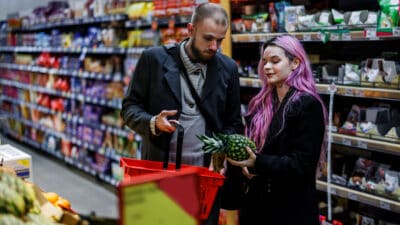COVID-19 cases in Sydney are still rising and Australia's largest city is immersed in lockdown for a further month at least.
There is fervent discussion in the media and no doubt among family and friends about whether the federal and NSW governments are taking the right course.
It is enough to get you pretty depressed about life, especially if you're in Sydney.
"The Delta variant of coronavirus responsible for much of the recent surge in cases is 2 to 3 times more transmissible than the original version with a shorter incubation period," AMP Capital chief economist Shane Oliver said on the company blog.
"Partly reflecting this, after more than 4 weeks in lockdown, the number of new cases in NSW has continued to trend up — albeit being very low by global standards."
But despite this gloom, OIiver reckons ASX share investors should keep their heads up.
"There remains light at the end of the tunnel," he said.
"There is a danger in over emphasising [the Delta threat] as we remain of the view that the economic recovery globally and in Australia will continue as lockdowns end in the short term."
Here are 5 reasons why he thinks this is so.
Lockdowns still work against Delta
Despite NSW's struggles so far, eventually it will win out.
"This is being seen in various Asian countries and in Australia, with Victoria, Queensland, WA & SA all managing Delta outbreaks with short lockdowns and able to reopen again without getting everyone vaccinated," said Oliver.
"While it may take longer in NSW because it started later, new cases are not exploding despite the Delta variant. In fact, the rate of increase is slower than seen in the Victorian wave from mid-last year. This suggests the NSW lockdown is helping."
Plus NSW has the advantage of a partially vaccinated population, unlike when Victoria battled the second wave last year.
Vaccines do work
Various countries with higher vaccination rates have started removing restrictions.
According to Oliver, this re-opening has seen coronavirus cases rise but with a far lower rate of hospitalisations and deaths.
"This is clear in the UK – which has also seen new cases fall in the last week," he said.
"The success of the vaccines can also be seen in the US with per capita new cases and hospitalisations in the top quartile of vaccinated states up to 25% below that in the bottom quartile of unvaccinated states."
Economy and ASX shares recover quickly once lockdowns end
Oliver suggested that the experience from the last 18 months shows that economic activity rebounds rapidly due to pent-up demand, once restrictions are lifted.
Government support during lockdowns also contributes to this.
"We are starting to see this in Europe where confidence and business conditions have rebounded above that in Australia and the US thanks to its reopening (after a double dip recession in the December and March quarters)," he said.
"It has been seen repeatedly in Australia after the numerous lockdowns, including the 3 to 4-month Victorian lockdown last year."
ASX shares could benefit from further fiscal and monetary support
The threat of the Delta strain will re-apply pressure on governments and central banks to not take their feet off the pedal in boosting their economies.
"Pressure for more stimulus (back to JobKeeper) is… ramping up in Australia and it will likely see the RBA delay its decision to reduce bond buying," said Oliver.
"It will increase pressure in the US to pass president Biden's $4 trillion 8-year American Jobs and Families Plans and will help keep the [Federal Reserve] dovish."
Lockdowns might be history soon
Perhaps spooked by Delta's ferocity, Australians are getting jabbed at a faster rate than before.
"Last week was the first with over 1 million vaccinations. At the rate of 1 million vaccines a week, Australia will hit 60% vaccinated by around year-end and 80% by mid-March," said Oliver.
"If we ramp it up to 1.5 million doses a week as global vaccine production ramps up, it will be 60% by mid-November and 80% by early January."
The economist's opinion is that once the 80% threshold is reached, a change of strategy against the virus could be considered.
"Beyond around 80% fully vaccinated, we should (new mutations aside) be able to start to live with coronavirus in the community without overwhelming the health care system, and keeping deaths down," Oliver said.
"This is the only way to end the snap lockdowns in a way that does not risk Australians' health and the economy. Because as we saw last year, countries that were lax in controlling coronavirus and allowed deaths to surge saw a bigger hit to their economies."









